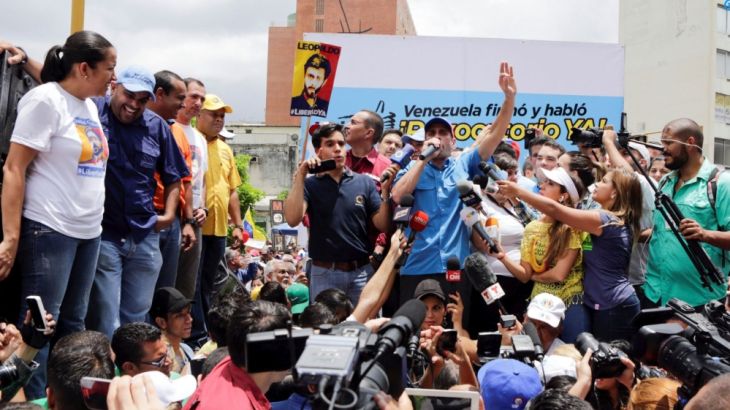Rival rallies in Venezuela amid emergency rule
Pro and anti-government protesters take to streets as president expands state of emergency to fight “economic war”.

Rival protests have taken place in Venezuela after President Nicolas Maduro extended a state of emergency to combat the “foreign aggression” he blamed for the economic crisis in the country.
The opposition called on protesters on Saturday to flood an avenue in western Caracas to push the authorities to allow a referendum to remove Maduro from power, in line with the constitution.
Keep reading
list of 4 itemsUS imposes new sanctions on Iran after attack on Israel
A flash flood and a quiet sale highlight India’s Sikkim’s hydro problems
Why is Germany maintaining economic ties with China?
Maduro’s camp called a rival demonstration in the centre of the capital, where he was to announce new measures to address a crippling recession that has led to food shortages, soaring prices, riots, looting and vigilante justice.
READ MORE: Venezuela opposition calls for push to oust Maduro
“The opposition protesters are trying to put pressure on the government and the electoral body to hold the referendum,” Al Jazeera’s John Holman, reporting from Caracas, said.
“The government protesters, on the other hand, blame outside powers for the crisis and see the opposition camp as ‘rich people’ trying to take advantage of the current economic situation,” he added.
The economic crisis, together with an electricity shortage, forced the government to decree daily power cuts across most of the country, close schools on Fridays, and reduce the workweek to two days for government employees.
The embattled president first declared a state of “economic emergency” in January, which was expanded on Friday to a full-blown state of emergency to fight what he called “threats from abroad.”
Likely to be extended to 2017
In an address to the nation, Maduro said the measures, initially decreed for three months, will likely be extended through 2017.
He did not specify if they will limit civil rights. The original economic decree authorised the government to seize private business assets to guarantee the supply of basic goods.
WATCH: Has Venezuela’s socialist revolution died with Chavez?
Maduro regularly blames US and local business interests for what his administration calls an “economic war” on oil-dependent Venezuela, whose economy has sunk in tandem with global crude prices.
Al Jazeera’s Holman said US officials recently said that they expected Maduro government to fall soon one way or another.
“The government is very weary of the US, believing that Washington is one of the reasons why the country is in this state,” he said.
Washington has had a rocky relationship with Caracas since Maduro’s late predecessor and mentor, Hugo Chavez, came to power in 1999, and the two countries have not exchanged ambassadors since 2010.
Venezuela has the world’s largest oil reserves, but its economy contracted 5.7 percent last year and its official inflation rate topped 180 percent.